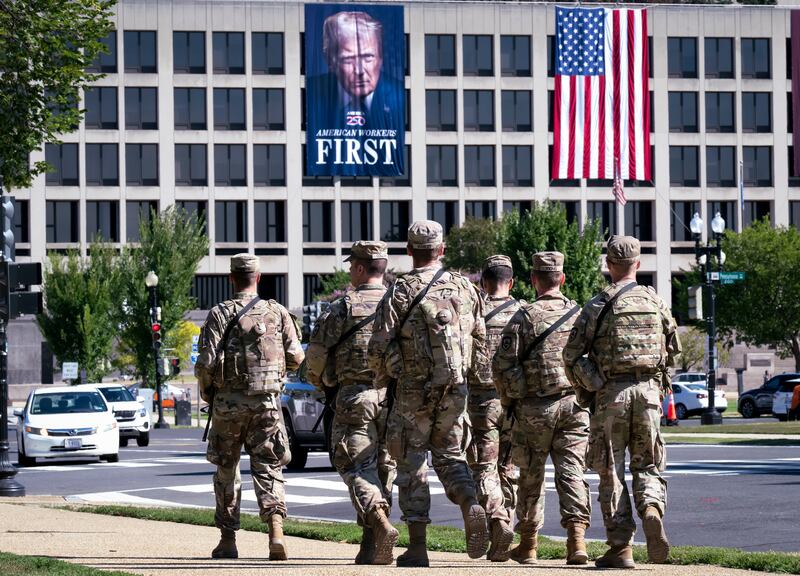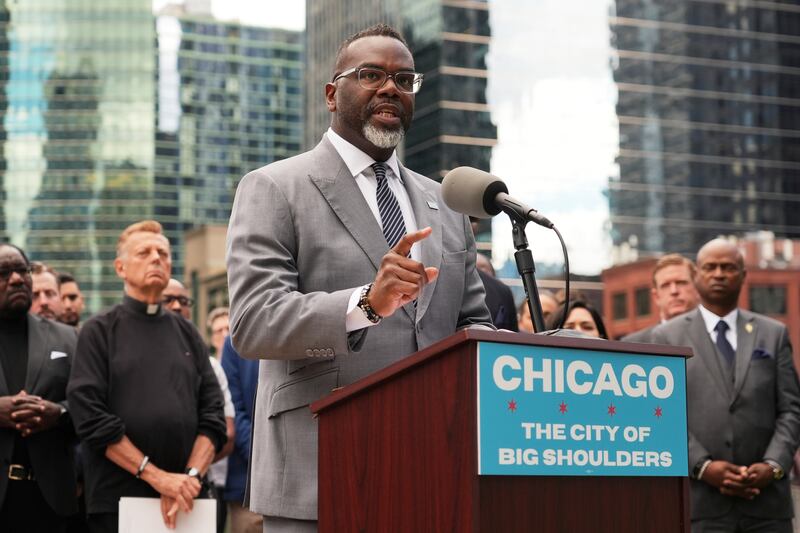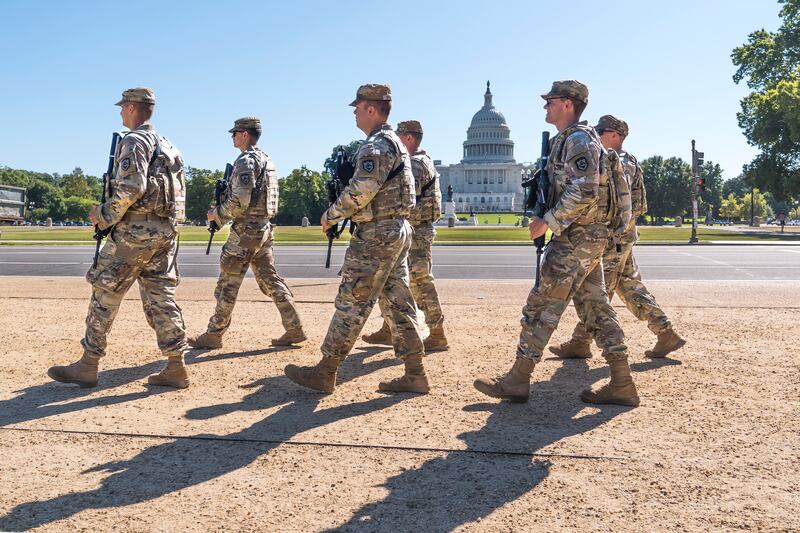President Donald Trump on Tuesday furthered his previous remarks about sending the National Guard to Chicago, sparking a battle with the city’s mayor and conversation about the dynamic between state and local law enforcement’s role when it comes to federal pressure.
After touting the success of the National Guard deployment in Washington, D.C., Trump has mentioned he’d like to target crime in other cities, too. He has now repeatedly called out Chicago and said in public remarks Monday and Tuesday that troops should be heading to Illinois once they’re done with Washington.

The threat has not been well received by state and local leaders in Illinois and sparked conversation about the constitutionality of the potential federal overreach, like the concerns raised earlier this year by California Gov. Gavin Newsom.
Political fighting
While signing executive orders in the Oval Office on Monday, Trump repeatedly brought up Chicago and the escalating tensions between him and Illinois Gov. JB Pritzker.
“Chicago, Illinois, is a disaster. I have property there. It’s a disaster,” Trump said, later adding, “I made the statement that next should be Chicago, because, as you all know, Chicago is a killing field right now and they don’t acknowledge it.”
The Washington Post reported over the weekend that the Pentagon has been planning a military deployment to Chicago for weeks. Pritzker said he had not been in touch with the Trump administration regarding their plans and only found out about the weekslong planning from the Post’s reporting.
Pritzker, a potential Democratic presidential 2028 candidate, has offered a stark warning for Trump about sending troops to Chicago. He warned that if Trump did send the National Guard to Chicago, the state would press on in a legal battle.
“What President Trump is doing is unprecedented and unwarranted. It is illegal, it is unconstitutional. It is un-American,” Pritzker said Monday in a press conference.
“Donald Trump wants to use the military to occupy a U.S. city, punish his dissidents and score political points. If this were happening in any other country, we should have no trouble calling it what it is, a dangerous power grab,” he continued. “Mr. President, do not come to Chicago.”
Chicago Mayor Brandon Johnson also railed against Trump’s proposal. Johnson argued there’s better ways for the president to drive down crime in major cities.

“The last thing Chicagoans want is someone from the outside of our city, who doesn’t know our city, trying to dictate and tell us what our city needs,” he said. “As the mayor of this city, I can tell you that Chicagoans are not calling for military occupation.”
Johnson, a first-term mayor, appeared on MSNBC on Tuesday and highlighted the city’s successful efforts to reduce crime.
“We’re working hard every single day to drive violence down in the city of Chicago. Since I’ve been in office, there’s been a precipitous decline in violent crime in every single category,” he said. “Just this year alone, we have a 32% reduction in homicides.”
Johnson argued that no mayor is specifically requesting that federal troops be deployed to reduce crime. He suggested that Trump could instead be in communication with city and state leaders to find out where the federal government could help.
“If this president was actually serious about driving violence down in the city of Chicago and American cities across this country, he would work with mayors to make sure that we have the necessary investments to continue to do the work that we have been doing,” Johnson said.
Trump addressed Pritzker and Johnson’s resistance to a potential deployment during a Cabinet meeting Tuesday.
“He should be calling me and he should be saying ‘Could you send over the troops, please? It’s out of control,’” he said.
Ramifications
If Trump were to send the National Guard to Chicago, it would spark a legal battle over state rights.
Earlier this year, when Trump deployed troops to Los Angeles during anti-immigration enforcement protests, he did so by declaring there was an emergency need to protect the federal buildings in the area.

While he has successfully deployed troops in Washington over the last several weeks, he did so under the District of Columbia’s Home Rule Act, which gives the president specific powers over the city.

In Chicago, or any other city, it would be a different story.
Newsom pushed back hard against Trump’s overreach, since it was the first time a president had deployed federal troops without the state requesting their presence. Without a clear emergency reason to send troops to Chicago, Trump would be openly defying Pritzker and plunging himself into a legal battle with one of the country’s largest Democratic-run cities.
If Trump overrode Pritzker and sent troops to Chicago, it would be limited to protecting federal assets and employees. If the president wanted the forces to be able to do more, he could evoke the Insurrection Act of 1807, which allows Trump to use the troops to tame unrest, Axios reported.
However, Elizabeth Goitein, an expert on presidential emergency powers and senior director of the Liberty and National Security Program at the Brennan Center for Justice, noted that the type of crime that Trump has referenced in Chicago, including violent street crime, is “overwhelmingly a matter of state and local, not federal, law.”
Meaning, even if Trump invoked the Insurrection Act, the troops could only execute the law in situations involving federal laws or state laws that are civil rights laws. Goitein also noted it would be an unprecedented move for Trump to ask other states to send their National Guard to Illinois and he would need to federalize them in order to do so.
While it remains unclear whether Trump will actually deploy troops to Chicago, or the other Democratic-led cities he’s mentioned, the issue could spiral into something more. Goitein argued it would be “an unprecedented abuse of power that would violate states’ rights.”


